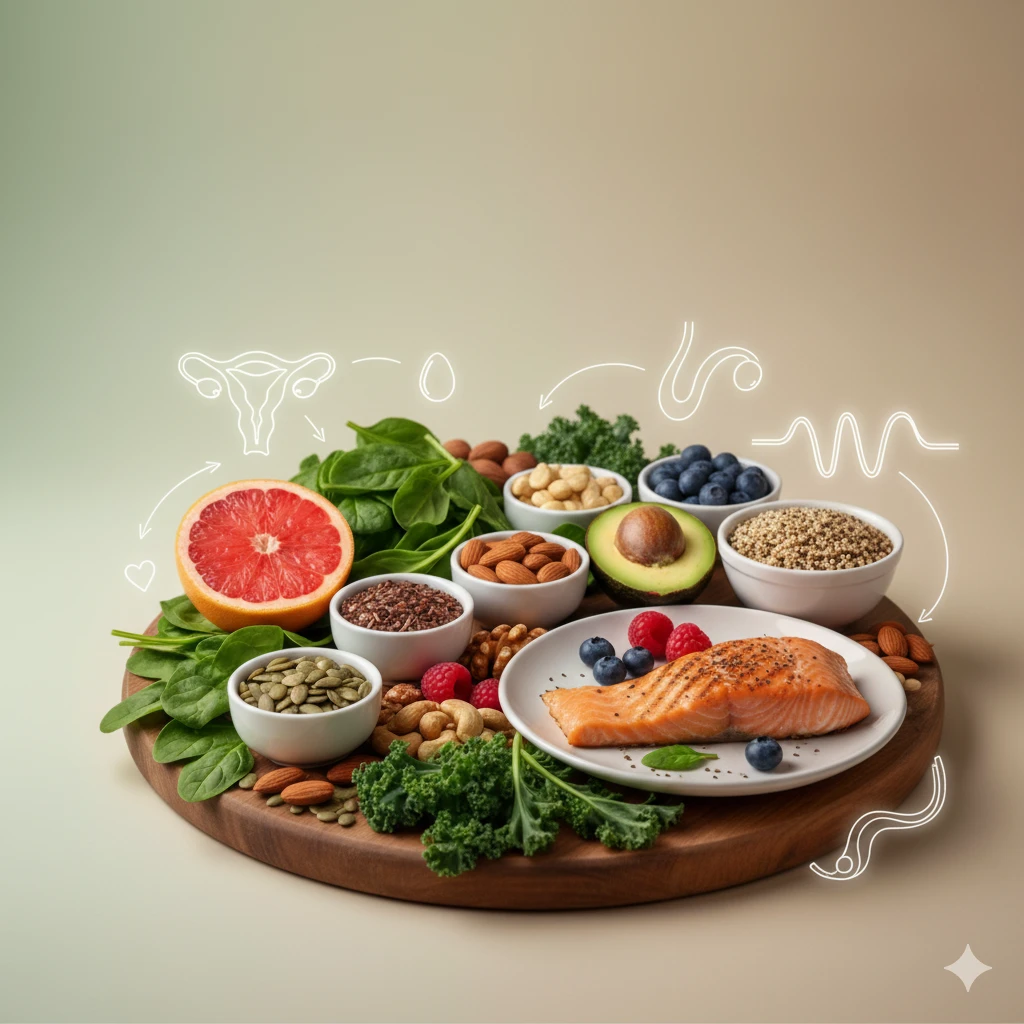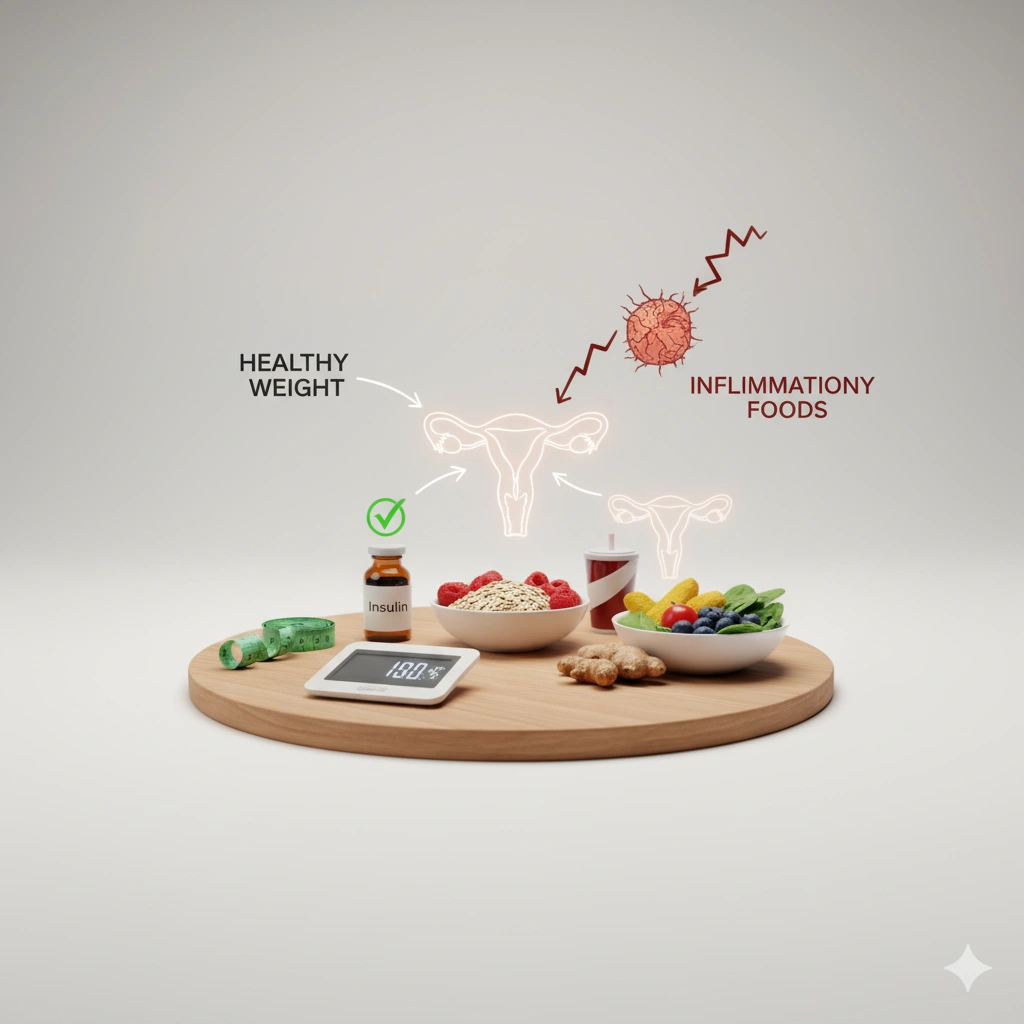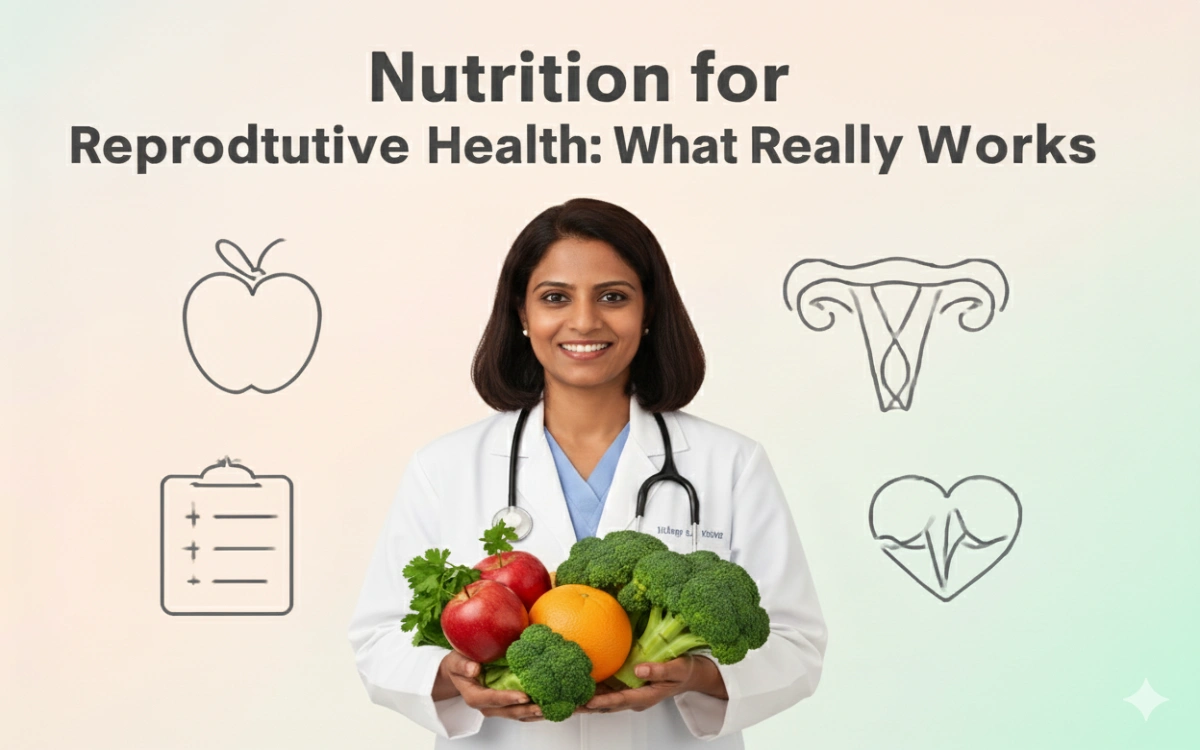Reproductive health is deeply connected to the way we nourish our bodies. What you choose to eat influences hormone balance, menstrual comfort, ovulation quality, and the body’s readiness for pregnancy. For many women, a focused effort on nutrition for reproductive health becomes the quiet turning point that steadies cycles, lifts energy, and creates a better foundation for conception.
The science behind this is straightforward. Hormones are made from nutrients. Follicles grow over several months and depend on steady supplies of amino acids, vitamins, and healthy fats. Meanwhile, the tissues of the uterus respond to blood sugar patterns and inflammation levels every single day. When your diet supports these processes, everything works more smoothly.
A healthy diet for women is not a rigid set of rules. It is a pattern that supplies protein for repair, slow carbohydrates for steady energy, and fats that the body can use to build hormones. It is also a way of eating that brings colour to the plate through vegetables and fruit that carry antioxidants to protect eggs from oxidative stress. Even if pregnancy is not your immediate goal, the same choices support menstrual comfort, bone health, thyroid function, and mood.
If you are trying to conceive now or preparing for the future, small improvements sustained over weeks and months are more powerful than short bursts of perfection. This guide explains the links between diet and fertility, highlights foods for hormonal balance, offers practical fertility nutrition tips you can start today, and shows how to personalise a plan that fits life in Dubai.
Why Nutrition for Reproductive Health Matters, Especially in Dubai
Daily routines in Dubai are fast, schedules are full, and the climate calls for thoughtful hydration. Many women find themselves skipping breakfast, grabbing quick lunches between meetings, and leaning on caffeine to carry energy through the afternoon.
Convenience foods solve a short-term problem but often bring excess sugar, refined starches, and low-quality fats that push blood sugar and insulin higher than ideal. Over time, these swings can disturb the delicate signalling between the brain and the ovaries. When the feedback loop is disrupted, ovulation may become irregular, premenstrual symptoms can intensify, and cramps may feel more intrusive.
Late dinners, heavy restaurant portions, and limited movement after work add to the burden. The good news is that supportive choices are easy to access here. Fresh produce is widely available, seafood is plentiful, and many restaurants offer smarter swaps when you ask.
Hydration is straightforward once you turn it into a habit by keeping a water bottle in view. In a city with world-class medical care, it is also simple to check vitamin D status, iron stores, and thyroid function, then correct any gaps with a plan that fits your preferences.
A small set of changes can restore balance and improve the odds of a smooth, healthy cycle.
How Diet Shapes Hormones, Ovulation, and Lining Health
Hormone regulation sits at the centre of reproductive wellbeing. Oestrogen and progesterone rise and fall across each cycle in a pattern that prepares an egg for release and the uterine lining for implantation.
To build these hormones, the body needs cholesterol in the right form, plus B vitamins, zinc, iodine, and vitamin D to run enzymes that shape each step. When healthy fats are scarce or micronutrients are low, the rhythm can falter.
Including foods like olive oil, avocado, nuts, seeds, and cold-water fish ensures the raw materials are present. Pairing those fats with quality protein from eggs, poultry, legumes, or dairy supports follicle development and helps maintain balanced blood sugar, which is essential for steady hormonal signalling.

Egg health is sensitive to oxidative stress. Every day, metabolism produces free radicals that can damage cells, and the ovary is not exempt.
Antioxidants from vegetables and fruit act as a shield. Dark leafy greens supply folate for DNA repair, berries provide anthocyanins that calm inflammation, citrus contributes vitamin C to regenerate other antioxidants, and tomatoes bring lycopene that supports tissue health.
When these foods appear on your plate most days, you feed the microscopic processes that determine whether an egg matures well and whether the uterine environment stays calm.
The uterine lining also responds to insulin levels. Very high post-meal spikes can encourage heavier, more uncomfortable periods in some women because insulin interacts with ovarian androgen production and oestrogen balance.
Choosing whole grains over refined flour, slowing meals with fibre and protein, and spacing added sugars through the week helps your body avoid extremes. The result is smoother energy, fewer cravings, and a friendlier hormonal backdrop for fertility.
Building a Healthy Diet for Women that Supports Fertility
A supportive pattern does not require complicated recipes. Think in layers:
- Base Layer: Plants. Aim for generous portions of vegetables at lunch and dinner, along with a daily serving or two of fruit. Variety matters because each colour brings a different set of antioxidants and minerals.
- Protein: Regular amounts, not just at dinner. Eggs or unsweetened yogurt at breakfast, legumes or fish at lunch, and poultry, tofu, or lentils at dinner keep amino acids available for tissue repair and hormone transport.
- Healthy Fats: Add through olive oil in dressings, a handful of nuts as a snack, or a portion of salmon a few times a week.
- Whole Grains: Oats, quinoa, and brown rice provide steady fuel and carry B vitamins that support ovarian function.
Hydration deserves its own paragraph because it is easy to overlook in a hot climate. Cervical mucus depends on fluid intake, and the uterus itself is a muscle that feels more comfortable when the body is well hydrated.
Sipping water throughout the day is more effective than drinking a large amount at once. Herbal teas and mineral water can add variety.
If caffeine is part of your routine, enjoy it in modest amounts and earlier in the day so sleep is not affected, since good sleep strengthens hormonal resilience.
Foods for Hormonal Balance That Are Easy to Include
Certain foods help many women because they meet common nutrient gaps:
- Leafy greens like spinach, rocket, and kale bring folate, magnesium, and calcium.
- Cruciferous vegetables such as broccoli and cauliflower contain compounds that support the liver’s handling of hormones, which can reduce bloating and breast tenderness before a period.
- Seeds and nuts supply minerals that act as cofactors in hormone production. Pumpkin seeds provide zinc, almonds and cashews bring magnesium, and walnuts and flaxseed contribute omega-3 fats that reduce inflammatory signals.
Seafood offers a useful combination of iodine, selenium, and long-chain omega-3s that support thyroid function and cell membranes.
If you prefer plant-based choices, pair legumes and grains to cover essential amino acids, consider algae-based omega-3 supplements if recommended, and pay attention to vitamin B12 through fortified foods or guided supplementation.
Fermented foods such as yogurt and kefir add friendly bacteria that keep the gut barrier strong. This matters because the gut influences oestrogen recycling and immune balance, both of which play a role in implantation and early pregnancy health.
Fertility Nutrition Tips That Fit a Busy Schedule
Routines are easier to keep when they respect real life:
- Anchor the day with a protein-rich breakfast within an hour or two of waking. A simple bowl of Greek yogurt with berries and a sprinkle of ground flaxseed provides protein, probiotics, fibre, and omega-3s in minutes.
- At lunch, build a plate around a palm-sized portion of protein and fill the rest with vegetables and a whole grain.
- In the afternoon, choose a snack that pairs protein with fibre, for example, a small apple with a few nuts.
- Eat dinner early when possible. Choose lighter sauces and cooking methods.
- Pause screens for a moment before eating so your nervous system shifts toward rest and digest, which helps you feel satisfied with smaller portions.
On days when meetings run late, carry a small emergency meal like a packet of nuts and a piece of fruit or a protein-rich bar with simple ingredients. These prevent the late-night rush toward heavy takeaways that leave you too full to sleep well.
If weekends are calmer, batch cook a pot of lentil stew, roast a tray of vegetables, or marinate chicken for easy grilling. A few prepared components make weeknights simpler and lower the temptation to default to refined options.
How Weight, Insulin, and Inflammation Connect to Fertility
The body is remarkably responsive to small improvements. If weight has crept up over time, even a modest reduction can improve how the ovaries respond to hormone signals.

That does not mean aggressive dieting. It means a steady focus on nutrient density, mindful portions, and movement that you enjoy enough to repeat.
Insulin resistance often travels with central weight gain and can disturb ovulation, particularly in women with polycystic ovary syndrome.
Spreading carbohydrates across the day, favouring high-fibre sources, and pairing them with protein are simple ways to ease the burden on insulin.
Anti-inflammatory patterns that emphasize olive oil, nuts, seeds, fish, legumes, and colourful produce can reduce cramping, steady mood, and support egg quality.
Special Situations That Benefit from Tailored Nutrition
Certain conditions require extra attention:
- Polycystic Ovary Syndrome (PCOS): Stabilising blood sugar with fibre-rich carbohydrates, regular protein, and healthy fats often leads to more regular cycles. Cinnamon in cooking, legumes at most lunches, and planned movement after meals can help.
- Endometriosis: An anti-inflammatory approach with generous omega-3 fats, plenty of vegetables, and limited ultra-processed foods may reduce pain intensity.
- Thyroid Disorders: Consistent iodine intake within recommended limits and adequate selenium from foods like eggs and seafood support hormone conversion.
- Iron Deficiency: Can delay ovulation and increase fatigue. Iron-rich foods, vitamin C to aid absorption, and guided supplementation when needed are important.
- Vitamin D Deficiency: Common among indoor workers and should be corrected since vitamin D participates in ovarian function and immune modulation.
Male partners benefit from these same principles. Sperm quality improves with antioxidants, zinc, selenium, and omega-3 fats, along with avoidance of tobacco, excess alcohol, and very high heat exposure to the testes.
Thinking as a team simplifies shopping and cooking, and it is encouraging to see improvements on both sides.
Testing for Nutritional Gaps and Using Supplements Wisely
Blood tests can reveal gaps that diet alone cannot fix quickly. A useful panel might include vitamin D, ferritin for iron stores, vitamin B12, folate, thyroid-stimulating hormone with antibodies when indicated, and HbA1c to review glucose control.
Correcting a true deficiency supports the entire reproductive pathway.
Supplements are helpful when targeted:
- Folic acid or methylfolate should be in place before conception to support early neural development.
- Vitamin D dosing should match lab results and be reviewed after a few months.
- Omega-3 supplements can be considered when fish intake is low.
- Iron should only be taken regularly after testing confirms low stores, as excess iron can cause problems.
A prenatal multivitamin is sensible for many women during preconception and the first trimester, yet it does not replace a thoughtful eating pattern.
Discuss any supplement plan with your doctor to avoid unnecessary overlap and to check for interactions with medicines.
A Day in the Life, Described in Real Food
Imagine a workday in Dubai that respects time pressure and health:
- You wake, drink a glass of water, and have a quick breakfast of eggs with tomatoes and a slice of whole-grain toast brushed with olive oil.
- Midmorning, you pause for a short walk around the office and sip water.
- Lunch is a generous salad with grilled salmon or chickpeas, quinoa folded through for texture, and a lemon olive oil dressing.
- In the afternoon, you take ten minutes outside for daylight and a yogurt with a few walnuts.
- Dinner is early, perhaps roasted vegetables with chicken or a bowl of dal with brown rice, finished with a spoon of yogurt and herbs.
- The evening wind-down includes a short stretch, phone off the bedside table, and a regular bedtime.
None of this is extreme, yet over weeks it shifts hormone balance, improves sleep, and builds a reliable foundation for fertility.
Frequently Asked Questions
Can diet really improve fertility?
Yes. Nutrition affects hormone production, follicle development, lining health, and the inflammatory environment in which implantation occurs. A nutrient-rich pattern that balances protein, fibre, and healthy fats can improve cycle regularity and support egg quality, especially when maintained for several months.
Which foods should I limit for better reproductive health?
Ultra-processed snacks, sugary drinks, and foods high in trans fats are worth limiting because they push blood sugar and inflammatory markers in the wrong direction. Large late-night meals and frequent alcohol can also disturb sleep and hormone balance.
How long does it take for dietary changes to show results?
Follicles take roughly three months to grow before ovulation, so many women notice steadier cycles and energy after eight to twelve weeks of consistent changes. Some benefits, such as reduced bloating, better sleep, and calmer mood, can appear within days.
Are well-planned plant-based diets good for fertility?
They can be excellent when they include adequate protein, iron, zinc, iodine, omega-3s, and vitamin B12. Fortified foods and guided supplementation fill the gaps, and variety ensures the full spectrum of amino acids and micronutrients.
Should I take supplements for fertility?
Targeted supplements help when a blood test confirms a deficiency or when pregnancy is planned. Folic acid is recommended before conception. Vitamin D should be corrected if low. Omega-3s are reasonable when fish intake is limited. Work with your doctor to choose the right products and doses.
Doctor’s Insight
Good nutrition is one of the most effective tools for reproductive wellbeing. I encourage women to view diet as a friendly rhythm rather than a strict rulebook.
When meals supply protein, healthy fats, and colourful produce, hormones have what they need to follow their natural patterns. Sleep improves, stress softens, and cycles often steady within a few months.
Every woman’s body is unique, which is why a personalised plan based on your goals, your labs, and your lifestyle in Dubai is the surest path forward.
Conclusion
Nutrition for reproductive health is not a trend. It is the foundation that allows hormones to find their balance, eggs to mature well, and the uterus to welcome early pregnancy when the time is right.
A healthy diet for women, built on real foods and supported by practical routines, offers day-to-day comfort and long-term protection.
When you incorporate hydration, movement, and sleep, your entire system responds with improved energy, more balanced cycles, and a stronger sense of well-being.
If fertility is your focus, these same choices become fertility nutrition tips that quietly raise your chances of success.
If you are not trying to conceive now, your body still benefits through easier periods, steadier mood, and healthier bones and heart.
If you want a plan that fits your preferences and your schedule, book a consultation with Dr. Neha Lalla at Prime Hospital, Dubai. Together, you can review your current routine, identify any nutritional gaps, tailor a diet for fertility or cycle comfort, and determine whether any supplements are suitable.
With clear guidance and steady support, your daily meals become a smart investment in your reproductive future.


